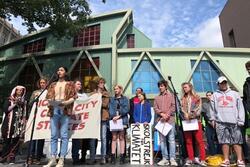This Digital Archive Will Be a Road Map for Activists
Two years ago, I read an article about Mizrahi feminist and human rights lawyer Sapir Sluzker-Amran that immediately captured my attention. It described how, since 2018, she has been collecting materials for Arhi-Parhi: The Civil Archive for Social Struggles in Israel. In using the term arhi-parhi which roughly translates as “riff raff,” the group is reclaiming a negative stereotype about Sephardi-Mizrahi Jews. But the words can also be translated from Hebrew more positively, as “flowering archive,” which is exactly what this collection is.
The items in the archive chronicle activist struggles in Israel-Palestine, from housing-insecure mothers to LGBTQ+ activists protesting the occupation. Until recently, it was physically housed in the College of Management Academic Studies in Rishon LeZion. Not anymore. Why?
Sluzker-Amran and her colleagues are in the process of digitizing the entire archive to make it a wholly collaborative, collectivized endeavor not owned by any one organization or confined to a particular space. Ideally, it will serve as a trove of histories that can help activists around the world move forward with the knowledge of their dissident elders’ triumphs and mistakes. “I don’t want her to feel as if she is starting all over again,” says Sluzker-Amran of a hypothetical activist.
Many of the materials collected in the archive are from ordinary people resisting by existing: flyers for queer party gatherings, oral histories of single mothers who participated in the 2011 social protests against Israel’s impossibly high cost of living, write-ups of the meetings of progressive and leftist organizations such as the Mizrahi/Israeli Black Panthers. They are also recording and storing the oral histories of activists, particularly those from marginalized backgrounds.
Finding and preserving these materials isn’t always easy. Sluzker-Amran told me about an incident in which an activist lost her own personal archive during a flood. Digitizing materials helps preserve and protect them.
The archive will also empower members of any social movement to incorporate strategies that worked for past activists, and to take a critical lens to ones that didn’t. Many activists “don’t think of themselves as leaders,” Sluzker-Amran says, “but they are.” Each person who participates in a protest, from its organization to its execution, is a leader in her movement and community, and in her own life.
Sluzker-Amran believes that imagining ourselves as leaders also allows women to see that they have power and agency in a world that often tells them not to challenge the status quo. When activists today see the work of those who came before them, they are reminded that they are alone in their struggle and they see the road ahead more clearly.
The goal of the digitized archive is to serve as a resource for activists not only in Israel-Palestine, but all over the world. Accessibility is a huge part of this mission, as Sluzker-Amran plans to have the site function not only in Hebrew, but in Arabic and English. Hopefully, via this digitized archive, activists around the world will be able to learn from and stand in solidarity with each other for a better world.
This piece was written as part the Jewish Media Fellowship through New Voices Magazine.






